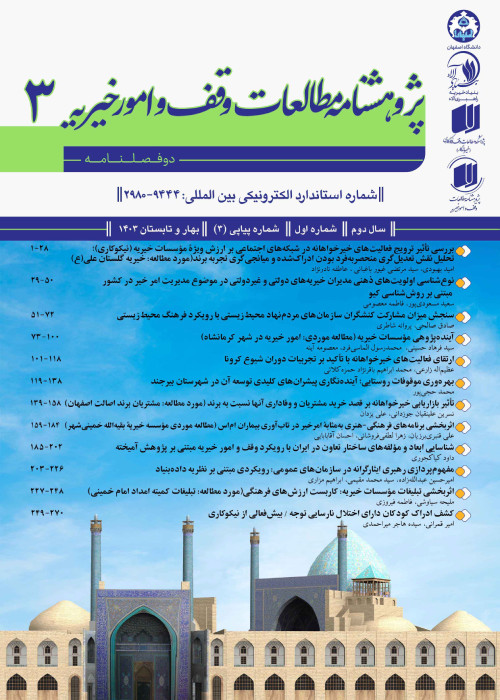The Effect of Cause-Related Marketing on Customers' Purchase Intention and Brand Loyalty (Case of study: customers of Esalat Isfahan Brand)
One of the most important marketing approaches is cause marketing, which has attracted the attention of many brands today. This type of marketing is done through cooperation with charity organizations or other charity methods. Therefore, the current research aimed to measure the impact of cause marketing on the purchase intention of customers and their brand loyalty. Previous research shows that global consumers are four to six times more likely to trust and buy from companies with a strong charitable purpose (Akoglu & Ozbek, 2022). The same trust that exists in companies with charitable activities in society is a strong reason for the success of cause-related marketing in attracting customers and their purchase intention (Wei et al., 2020). Cause-related marketing is a multi-purpose and growing activity in the field of marketing. This provides opportunities for profit and non-profit organizations and consumers to participate in a social goal (Bhatti et al., 2023). Recently, this marketing method has received more attention from companies and organizations as well as researchers. The review of previous research in this field shows that efforts have been made by researchers to investigate the impact of this type of marketing on the purchase intention of customers, but the review of domestic and foreign research showed that so far there has been no research on the impact of charitable marketing on customer loyalty, and from this point of view, there is a research gap in the field of literature related to this type of marketing.
The current research is practical in terms of purpose and descriptive correlation in terms of data collection. The statistical population in this study was considered to be all consumers over 18 years of age of the products of Esalat Food Company in Isfahan city, and due to their large number and their uncertainty, the number of the statistical population was considered unlimited. The sampling method in this study was available sampling. The number of samples based on Cochran's formula in unlimited societies, with an error value of 5%, was considered to be 384 people. The data were collected both in the library and the field. In the library section, data was collected by referring to articles, books, and theses, and a questionnaire was used in the field section.The research is applied in terms of purpose and descriptive-analytical in terms of nature. Data collection was done through three questionnaires of cause-related marketing by Thomas et al. (2019), the purchase intention of Khatoon et al. (2020), and the brand loyalty of Altulkar (2020). Data analysis was done by structural equation method and using Smartpls3 software.
The results of the structural equation model analysis showed that charitable marketing has a significant effect on customers' purchase intention with a coefficient of 0.254. Also, charitable marketing has a significant effect on brand loyalty with a coefficient of 0.928. The mediating role of customers' loyalty to the brand was also confirmed in the relationship between charitable marketing and customers' purchase intention with an impact factor of 0.678. Therefore, using charity marketing is one of the ways to increase customer loyalty and improve their purchase intention.
Based on the investigated results, hypothesis 1 was confirmed. In other words, benevolent marketing has a positive and significant effect on customers' purchase intentions. In explaining this result, it can be said that the results of this hypothesis are consistent with the research of Khanifar et al. (2021). As it became clear from the evaluation of the research literature, charitable marketing has been very welcomed by its audience considering that it affects people's sense of altruism.In this study, hypothesis 2 was confirmed. In other words, charitable marketing has a significant effect on customer loyalty to the brand. The results of this research are consistent with the research of Bhatti et al. (2023) and Karimi et al. (2020). What is important for companies is the loyalty of customers to their products and brands. The third hypothesis was also confirmed. In other words, customer loyalty toward the brand has a significant effect on the relationship between charitable marketing and customer purchase intention. The results of this hypothesis are consistent with the research of Kou and Chen (2023). In the interpretation of this hypothesis, it can be stated that the charitable activities of companies can increase the willingness and intention of customers to buy the product more clearly and quickly.
- حق عضویت دریافتی صرف حمایت از نشریات عضو و نگهداری، تکمیل و توسعه مگیران میشود.
- پرداخت حق اشتراک و دانلود مقالات اجازه بازنشر آن در سایر رسانههای چاپی و دیجیتال را به کاربر نمیدهد.


